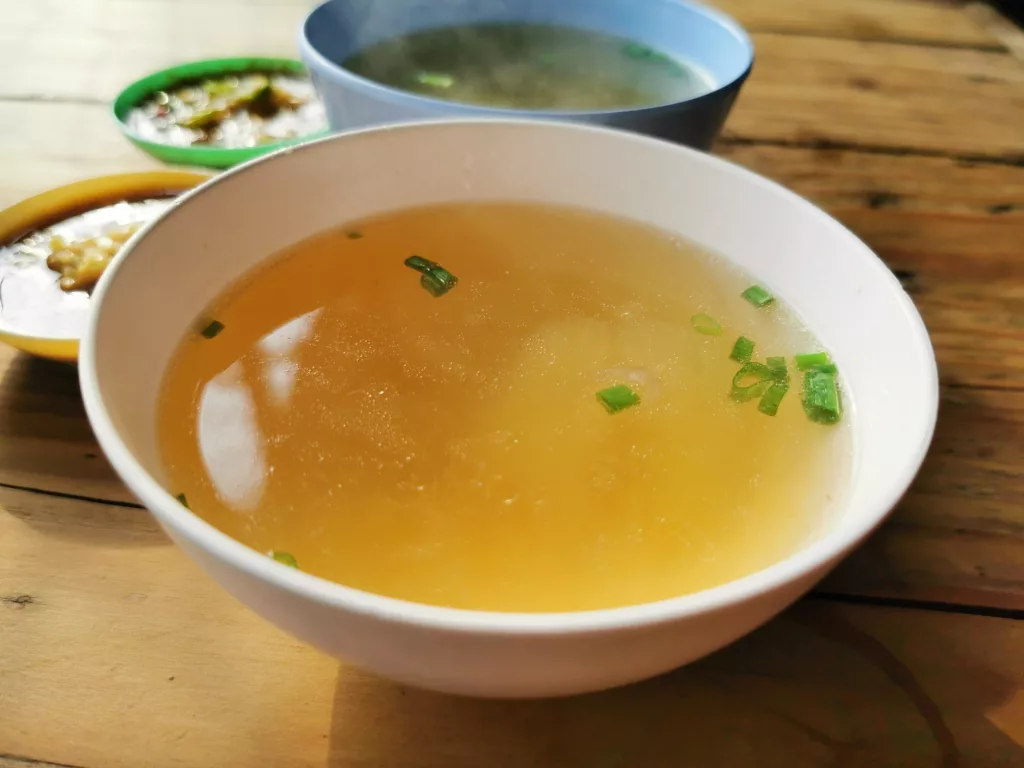Is Miso Soup Vegan? Rooted in Japanese culture and boasting a rich history, miso soup has gained prominence in various diets. However, as veganism gains momentum, concerns regarding its vegan-friendliness have arisen. Are its ingredients truly devoid of animal products? This article takes you on a journey exploring plant-based variations of this traditional Japanese delicacy, uncovering the truth about its alignment with a vegan lifestyle. Join us as we delve into the depths of miso soup to unravel its vegan status.
Ingredients of Traditional Miso Soup
Traditional miso soup consists of a few key ingredients. The star of the show is miso paste, made from fermented soybeans, salt, and koji. It brings a unique and savory flavor to the soup. Additionally, dashi stock, typically made with bonito flakes or katsuobushi (fish flakes), contributes a rich umami taste. Other components may include tofu, seaweed, green onions, daikon radish, and mushrooms. However, it’s important to note that the inclusion of bonito flakes or fish-based dashi makes the traditional version of miso soup non-vegan.
Is Traditional Miso Soup Vegan?
No, traditional miso soup is not considered vegan due to the presence of animal-derived ingredients such as bonito flakes or fish-based dashi. While miso paste itself is typically vegan, the inclusion of these fish products compromises its suitability for those adhering to a vegan lifestyle. However, it is worth noting that vegan-friendly alternatives exist, allowing individuals to enjoy a plant-based version of miso soup without the use of animal-derived ingredients.
Vegan Alternatives for Traditional Miso Soup
Miso Paste
Opt for certified vegan miso paste, which is crafted solely from fermented soybeans, salt, and koji. Ensure to check the label to confirm that no animal-derived additives or flavorings are included.
Dashi Stock
Replace fish-based dashi with vegan-friendly options. Kombu dashi, made by simmering kombu (edible kelp) in water, provides a robust umami flavor. Alternatively, shiitake dashi, created by steeping dried shiitake mushrooms, offers a savory profile.
Protein Options
Tofu, a staple in miso soup, remains a suitable choice for a plant-based version. Firm or silken tofu can be added, providing a satisfying texture and protein boost.
Vegetables and Seaweed
Include an assortment of vegetables such as green onions, daikon radish, mushrooms, and leafy greens to add depth and nutrition to the soup. Wakame, a type of seaweed, can be used to impart a subtle oceanic flavor.
Flavor Enhancements
Enhance the taste of the miso soup with other vegan-friendly ingredients such as tamari or soy sauce, mirin, rice vinegar, and sesame oil. These additions contribute additional layers of umami and complexity to the final dish.
Homemade Vegan Miso Soup Recipe
Indulge in the comforting flavors of a homemade vegan miso soup, a nourishing and flavorful dish that showcases the essence of Japanese cuisine while catering to plant-based dietary preferences. This simple yet satisfying recipe combines miso paste, tofu, vegetables, and a delicate balance of seasonings to create a bowl of goodness that will warm both body and soul.


Feel free to customize the recipe by adding or substituting vegetables of your choice, such as daikon radish, carrots, or corn kernels.
FAQ: Vegan Miso Soup
It depends on the restaurant. Some establishments offer vegan miso soup or are willing to accommodate dietary preferences, while others may use traditional fish-based ingredients. It’s best to inquire with the restaurant beforehand.
Yes, there are vegan dashi stock options available in some specialty stores or online retailers. Look for dashi powders or granules labeled as vegan or specifically made from plant-based ingredients.
Experiment with vegetable-based toppings like roasted vegetables, tofu variations, or unique additions such as edamame, corn, or roasted seaweed strips to add flavor and texture to your vegan miso soup.
Yes, ingredients like tamari or soy sauce, rice vinegar, mirin, and sesame oil are commonly used in miso soup and are vegan-friendly. These seasonings enhance the umami flavors and authenticity of the dish.
Conclusion
Vegan miso soup offers a delectable alternative to the traditional recipe, accommodating plant-based diets without sacrificing taste or cultural significance. By making simple ingredient substitutions and embracing vegan-friendly options, one can enjoy the rich umami flavors and nourishing qualities of miso soup while staying true to their ethical and dietary preferences.
So, indulge in a bowl of vegan miso soup and relish the harmonious blend of flavors, knowing that it aligns with both your taste buds and your compassionate choices.




